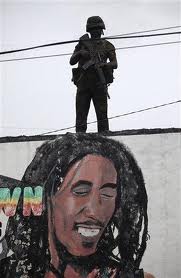Reggae 101: ROCKERS - Rasta's Cinematic Opus
Step one: wave away the weed smoke from in front of your television screen and ignore the amateur acting. Step two: focus your third eye and look past the random, yet moving, reggae performances. Immediately following steps one and two, you and any untrained eye can see why Rockers was the most accurate, un-romanticized cinematic depiction of Rastafarian (“Rasta”) culture EVER. Rockers is not only the movie title, it is also the name of reggae music performed almost exclusively by Rastafarians. It is safe to say that the Rockers music in the movie is one of the main characters. What makes the music’s presence blatantly obvious is the movie’s castlist, which reads like a “Who’s Who” of Rockers music legends. Just to name a few (in no particular order): Jacob Miller, Sly and Robbie, Jack Ruby, Gregory Isaacs, Burning Spear, Big Youth, Dirty Harry, Horsemouth, Leroy Smart, Joe Gibbs, and the list goes on (believe it or not). Watch the movie, if you don’t believe me… it’s on Netflix. Go ahead, I’ll wait. Are you done? You see what I mean?! It’s like watching a reggae encyclopedia. But I digress. Rockers did for Rastafarian culture in Jamaica what Boyz N the Hood did for gang culture in South Central Los Angeles. Both movies offered a different perspective on a highly criticized group of brown people, who were merely reacting to the circumstances in which society placed them. In fact, I can think of two reasons why Rockers became an instant cult classic among reggae fans globally.
Reason Number 1: Rockers counteracted Rastas’ negative image
Anyone who lived in urban or rural Jamaica during the late 1960’s to early 1980’s can tell you that Jamaican society DID NOT welcome Rasta culture with open arms. It is no secret that Jamaica initially refused to acknowledge Rasta, because Rasta completely contradicted the high-brow, conservative mindset that the English forced on the island prior to, AND after, Jamaica’s independence. The political majority depicted Rastas as violent, marijuana smoking, religious heretics. The two fatal flaws in that line of reasoning are obvious. First, from what I hear, marijuana makes you hungry and tired but BY NO MEANS makes you violent. Second, it was irrational for the powers-that-be to brand Rastas as irreligious, because Rastafarian doctrine is largely Christian-based. However, Rockers the movie cleared up these misconceptions. The movie highlights Rastas’ political awareness by including social commentary songs, such as “Police and Thieves,” “Tenement Yard,” and “Slave Master.” Rockers also brought attention to Rastas’ religious discipline by inserting “chant” monologues—where a character would face the camera and profess his respect for “the Creator,” as well has his reverence for his religious doctrine preaching peace and “Inity.”
Reason Number 2: Rockers made urban Jamaica accessible to suburban folks
Let’s be honest, most people who are from relatively safe, suburban neighborhoods are generally afraid of violent, inner city neighborhoods. 1970’s Kingston had a plethora of rich, urban culture to offer, but non-residents rarely had an opportunity to enjoy a genuine firsthand experience of Kingston. Rockers permitted that firsthand experience. Rockers’ authentic depiction of Kingston life AND Rasta culture were second to none. Director Theodoros Bafaloukos was able to construct an organic view of the culture because he immersed himself in Jamaican culture for half a decade before he began shooting the film. Bafaloukos, New York-raised but of Greek decent, wanted to avoid typical screen shots of Jamaica like palm trees, natives with plastic smiles, and beach resorts. In contrast, the movie was laden with scenes of gritty Kingston homes with zinc roofs and street parties headlined by Downbeat International and Joe Gibbs Sound System. These are the scenes that entranced diehard reggae fans, who had limited access to that Kingston lifestyle—similar to what movies like Beat Street and 8 Mile did for hip-hop fans disconnected from the lifestyles they idolized.
Rockers not only became an instant cult classic, it was also remarkably critically acclaimed. It was screened for the first time at the Los Angeles Film Festival in front of a sold out crowd of 800 patrons. Rockers became such a runaway, esthetic success that the film called for another screening at the end of the festival because of viewers’ high demand. Also, the film subsequently sold out its screening at the Cannes Film Festival in France. Afterwards, the conservative French newspaper, Le Monde called Rockers a “work of art” rather than a “film.” In most viewers’ and reggae fans’ opinions, Rockers’ legitimacy and relevancy is directly attributable to its authenticity. For these reasons and more, Rockers is arguably the most influential, widely disseminated cinematic Rastafarian Manifesto ever recorded.



